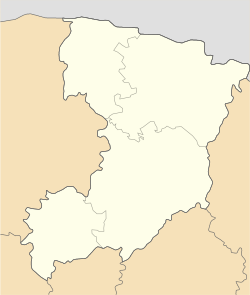This article needs additional citations for verification. (July 2021) |
You can help expand this article with text translated from the corresponding article in Ukrainian. (November 2024) Click [show] for important translation instructions.
|
Velykyi Zhytyn (Ukrainian: Великий Житин; Polish: Żytyń Wielki) is a village in the Rivne Raion in the Rivne Oblast in north-western Ukraine with about 1,200 inhabitants (2006).
Velykyi Zhytyn
Великий Житин Żytyń Wielki | |
|---|---|
 St Michael’s Church (1767) | |
| Coordinates: 50°39′18″N 26°21′5.76″E / 50.65500°N 26.3516000°E | |
| Country | |
| Oblast | |
| Raion | Rivne |
| Area | |
• Total | 1.84 km2 (0.71 sq mi) |
| Elevation | 192 m (630 ft) |
| Population | |
• Total | 1,232 |
| • Density | 670/km2 (1,700/sq mi) |
 | |
It is located on the regional road P-5 and P-77 9 km northeast of the oblast and Raion seat Rivne. The Kustinka River, a tributary of the Horyn, flows through the village.
History
editThe village was mentioned in 1518 in an act of the King of Poland Sigismund I the Old. In this act, he confirmed his rights over the estates of Prince Kostiantin Ivanovich Ostrozky, inherited from his wife's grandmother—Maria Rivne-Nesvitskaya—and her husband Prince Semyon Nesvitsky.
The first Ukrainian president, Leonid Kravchuk, was born in Velykyi Zhytyn in 1934. At that time, the village was part of the Second Polish Republic.[1]
Following the joint German-Soviet invasion of Poland, which started World War II in September 1939, the village was first occupied by the Soviet Union until 1941, then by Nazi Germany until 1944, and then re-occupied by the Soviet Union, which eventually annexed it from Poland in 1945. From October 1943 to February 1944, the German occupiers operated the Stalag 360 prisoner-of-war camp in the village.[2]
References
edit- ^ Motyl, Alexander J. (2019). "The Conceptual President: Leonid Kravchuk and the Politics of Surrealism". Patterns in Post-Soviet Leadership. pp. 103–121. doi:10.4324/9780429301162-6. ISBN 9780429301162. S2CID 199306662.
- ^ Megargee, Geoffrey P.; Overmans, Rüdiger; Vogt, Wolfgang (2022). The United States Holocaust Memorial Museum Encyclopedia of Camps and Ghettos 1933–1945. Volume IV. Indiana University Press, United States Holocaust Memorial Museum. p. 363. ISBN 978-0-253-06089-1.



